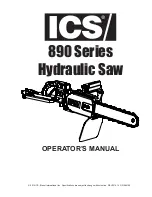
31
Auxiliary Fence - Certain types of molding
need a fence face extension because of the
size and position of the workpiece. Holes are
provided in the fence to attach an auxiliary
fence. The auxiliary fence is used with the saw
in the 0° bevel position only.
1. Place a piece of wood 1 against the miter
saw fence (Figure 24). Wood can have a
maximum height of 4” on the left side and
4” on the right side. Maximum thickness
for the wood is 1/2”. Check that head
assembly does not interfere with auxiliary
fence.)
2. Mark the locations of the support holes on
the wood from the back side of the fence.
3. Drill the holes on the back of the support
board.
4. From the back side of the miter saw
fence, attach the auxiliary fence using
four (4) flat head screws 2. Make a full
depth cut to create the blade slot 3. Check
for interference between the auxiliary
fence and the lower blade guard. Make
adjustments as necessary.
WARNING
Check for interference
between auxiliary fence
and saw head components by performing a dry
run. Fence interference can prevent proper
saw operation and cause injury and/or tool
damage.
Table Extension
WARNING
Always extend and use
table extension when
making cuts to maintain safe hand distance
(minimum 6” from blade to hand) .
Install the table extension to the side of the
base where hand support is needed to properly
support the workpiece.
1. Loosen the thumbscrew 1 in table
extension channel (Figure 26).
2. Slide table extension 2 to the desired
position.
3. Tighten thumbscrew 2.
1
3
2
2
Fig. 24
2
1
Fig. 26
4”
4”
20-1/4”
Fig. 25
















































